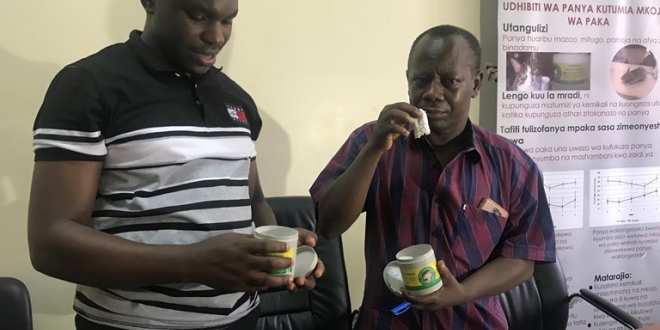In an interview with several farmers in the village, they said the big number of rodents that had invaded crop fields and maize warehouses had been driven away after the application of the Cat urine odour.
After applying the Cat urine odour in the crop field or at home, it can take up to six month without seeing any rats. They are all afraid and quickly run away to undisclosed places, said Mweleza Rajabu Maluma, a farmer at Mikese village near Morogoro town.
The Cat urine odour is a good research work of a Tanzanian scientist Prof. Loth Mulungu from Sokoine University of Agriculture (SUA) in Morogoro.
Maluma explained that when the scientists arrived in the village during the first testing and trials, the farmers held a meeting that was followed by a training.
After the training, they applied the Cat urine odour in the crop fields and at the homes and after two days all the rats had disappeared.
Maluma who grows different crops such as maize said that the population of rodents in the village was so high such that some could even bite people at night when sleeping but now they have all disappeared.
“There are some men who have been wounded at their fingers as a result of the presence of the rodents in their homes. However, after application of this new technology, the men are now safe.
This is the most effective and efficient method to keep at bay the rodents. The farmers participatory approach of the field trial worked out well and the trial showed effective and efficient as compared to other methods,” she said. “I was surprised when the professors said that it is better to expel the rodents rather than killing them because they have also some benefits to our daily life,” she added.
Contacted for comments, one of the hamlets chairman at Mikese village, Mohamed Kalungwana explained that the Cat urine odour had beckoned many farmers, they now want it to be available in retail shops with affordable prices.
“I have witnessed with my own eyes, when you put the Cat urine odour, the rodents are scared and leave the crop field. At home, when you put it inside the house you can store maize for more than six months without seeing the rats around,” he said.
Kalungwana who is also one of the farmers at Mikese said if the farmer applied the Cat urine odour during planting of the maize, the rodents will not enter the farm until the time of harvesting.
He said before this new technology, they were using other lethal methods particularly poison which they were mixing with maize flour or tomatoes. However, this method was dangerous as it could kills chickens. Many chickens had been killed by the poison.
“This new method of using Cat urine has helped the farmers. I applied it the first day and after two days, all the rodents had gone away from the maize field,” he said.
Kalungwana called on the government to make sure that the Cat urine odour should be commercialized and sold in the retail shops so that many farmers can benefit. Mikese village executive officer, Haji Hamis Maridadi said that the researchers at SUA should be supported to ensure that the Cat urine odour reaches farmers in the rural areas where there are many crop fields.
During the training, we were taught different types of rodents and the effect they have on crops particularly maize and other cereal crops.
Similar education should be given to other farmers in different parts of the country so that they too should start applying the Cat urine odour,” said Mikese ward extension officer, Bahati Nehemia Samzugi. “We applied it in 21 houses and proved to be effective at home and in the crop fields,” she said.
Commenting on the Cat urine odour, Prof. Loth Mulungu from the pest management centre at Sokoine University of Agriculture (SUA) said that the technology will provide a long term solution to rodent control compared to lethal control methods such as the use of rodenticides.
“It is the potential rodent management strategy in crop fields in Tanzania which is due to be completed by March next year in 2019,” he explained.
The research is funded by the government through the Tanzania Commission for Science and Technology (Costech). He said that the rodents needs a long term strategy as they tend to breed quickly and infest crops leading to serious economic damage.
“ In Tanzania, damage to crops is largely attributed to Mastomys natalensis in fields and Rattus rattus in stores. Currently, reducing the size of rodent pest populations generally relies on lethal control methods, including the use of rodenticides.
These methods, however, provide only a short-term solution because the colony soon recovers and the problems posed by the rodent persist,” he said. Explaining more on the lethal methods which are normally used by the farmers, he said that the methods are often uneconomical, environmentally hazardous hence, socially unacceptable, he added. He said that there are increasing demands for effective, non-lethal approaches to be developed.
Non-lethal management technology would produce a significant decrease in rodent pest activity within sensitive (crop fields) area and, in the longer-term, reduce the numbers of problem of rodents in the vicinity. Chemical repellents signals could produce an immediate avoidance response in rodent pests and hence restricting the growth of problem populations in a crop field.
“This project therefore, aimed at providing a “proof of concept” for the use of predator-derived odour to limit crop loss in field especially during the susceptible crop growth stages, he said.
Commenting on the Director for the pest management centre at SUA Dr. Ladslaus Mnyone said the research done by Tanzanian scientists should be given priority because they have direct impact on the general public.
“The research is good because they are building capacity to our researchers and the students in different levels. Our research targets solving challenges facing the general public such as the farmers,” he said.
Director General for the Tanzania Commission for Science and Technology (COSTECH) Dr. Amos Nungu commended the technology saying it will help to address the farmers’ challenges.
“We are looking forward to see the final results so that we can take it to the end users and the general public,” he said Agriculture is a key to industrialization agenda of the fifth phase government.
It provides food, nutrition and raw materials, therefore, we must make sure that the technology to control the rodents works out,” he added.
He called on scientists and researchers whose research activities have impact and aims at addressing challenges facing communities and the general public at large.
Credits
This article was originally written and published by The Guardian Newspaper. Click here to read the original article




